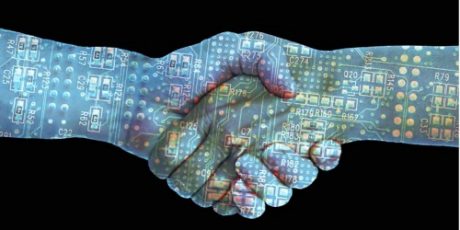
Blockchain: what is it and why should you care?
Perhaps that headline could more accurately read: blockchain is already in the process of blowing up and doesn’t look set to slow down any time soon.
If you work in tech like me you’ll no doubt have heard the word hundreds of times, perhaps to the point where it’s in danger of entering buzzword territory.
But behind the trend is something undeniably exciting for anyone interested in how tech can – and does – shape the world.
I’m sure you’ve already heard of blockchain’s value in the fintech world. In our research earlier this year, we explored the blockchain marketplace to get a snapshot of how many start-ups were operating in this sector, where they were, and what they were doing. 68 of the 140 companies we discovered fell into the fintech category.
But as Alison Vincent discussed in her recent blog post, this technology has the potential to make an impact far beyond Bitcoin and banking.
And the findings from our research certainly support that sentiment, highlighting the real reason blockchain is set to explode: the vast number of use cases beyond finance.
Number of European blockchain start-ups by sector:
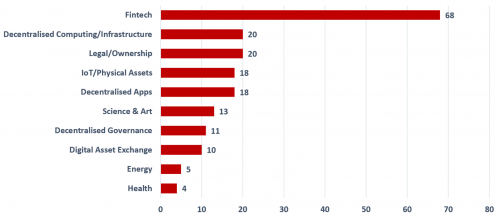
From healthcare and the Internet of Things (IoT) to science and decentralised government, this technology has the potential to significantly impact the way people live and do business across the world.
And, more importantly: transform people’s lives.
I’m going to talk about some of the fantastic start-ups we uncovered that fall outside the fintech bracket.
But first: that all-important question (and one which – dare I say it – many in our industry are perhaps afraid to ask)…
What is blockchain?
It’s impossible to talk about blockchain without mentioning Bitcoin – the former was created as an engine for the latter.
In that context, then, blockchain is a decentralised digital ledger that records every Bitcoin transaction ever made – who paid whom, how much, and when.
It’s decentralised in the sense that no one person or organisation has control or ‘admin rights’ over that database.
When a transaction occurs, details are sent to every computer in the network, at which point it’s simultaneously and independently verified by all of those ‘nodes’ using a complex algorithm.
This process is known as ‘mining’, and ‘miners’ are rewarded with bitcoins as an incentive to keep the blockchain going.
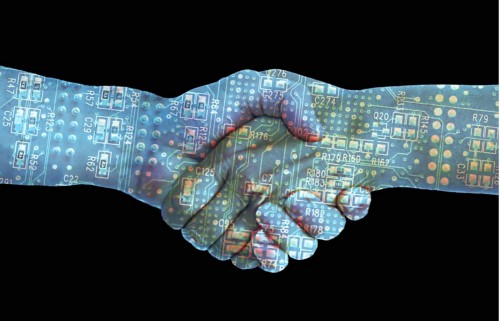
The thing that makes blockchain so potentially powerful and valuable, however, is this:
Once a transaction is verified and that data enters a blockchain, it can’t be removed or amended by anyone.
This has massive implications for the way we make financial transactions, but think about all the other potential applications for a network with that level of transparency, security and authenticity.
Companies across the world are now taking the processes and principles or blockchain and adopting them for solutions far removed from its original purpose.
Here are some of my favourite use cases…
Decentralised infrastructure
The beauty of blockchain, and arguably the most exciting opportunity for this technology, is its ability to completely eradicate barriers historically present between different parts of the world, such as access to talent and localised currency.
One of the start-ups our research highlighted, Colony, aims to do exactly that, effectively crowdsourcing a company by bringing together people from all over the world to collaborate on large-scale projects.
Contributors are then paid using cryptocurrency that is directly linked to activity carried out, meaning they get paid in direct proportion to the amount of work they do.
Healthcare
Anyone who’s been following the recent news around the NHS scrapping its Care.data project will know what a contentious issue the sharing of healthcare data can be.
But tracking that data is critical to the future of medicine, and medical blockchain start-up DNA.Bits has found a way, it says, to carry out this life-saving work without compromising patient privacy.
Using blockchain cryptography, the firm claims it can tag, track and cross-reference health data completely securely and anonymously. Could this finally solve the ongoing healthcare data privacy conundrum?
Supply chain authentication
Describing itself as ‘a framework for knowledge’, Project Provenance claims to help build trust and tackle counterfeiting in physical products by creating a digital record of that product’s journey.
Each physical item is given a ‘digital passport’, and every stage of its journey is tracked – from raw materials right through to the shop shelf, meaning companies have a way to prove their products’ authenticity while consumers can feel confident purchasing them.
The key with Project Provenance is that it is open – anyone can contribute to an item’s digital story, and that story is accessible to everyone.
UK leading the way
The most exciting thing about all this is that the UK is absolutely charging ahead when it comes to blockchain innovation, leading the way with this technology across Europe.
Of the 140 blockchain start-ups we highlighted in Europe and Israel, 58 of them are based in the UK. To put that in perspective, second-place Israel has only 18 while third-place Italy has just 10.
Number of European blockchain start-ups by country:
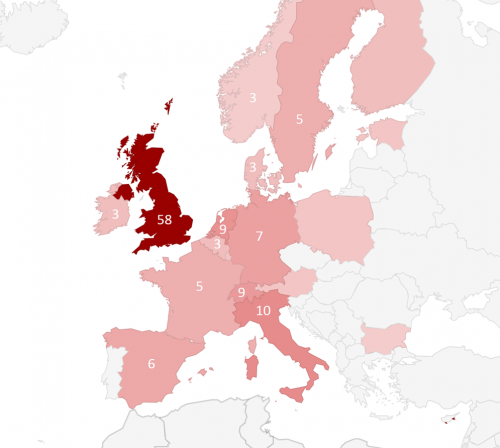
What an incredible light this shines on the UK once again as a world-leader in tech innovation – something to be really proud of.
It’s also worth noting that of the 140 companies in the research, only 21 of them (15%) were more than two years old.
This technology is still very young, and with the early enthusiasm we’ve already seen I’m positive we’re only on the very cusp of what we can achieve.
Enjoyed this post? Be sure to follow us on Twitter for a daily dose of insight.
Tags:3 Comments
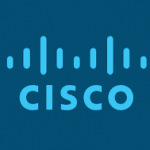



This will be interesting; in a cashless blockchained world, how will the ‘military (intelligence world) industrial complex’ get away with their illegal constructs? Will this be a case of parallel and secret systems and how will this happen without detection? If regulators & police are in the BC loop, will this end trader/City fraud, or will this be another case of sports cheats staying ahead of the game using ever more sophisticated masking agents?
Block chain is a vital component in our business